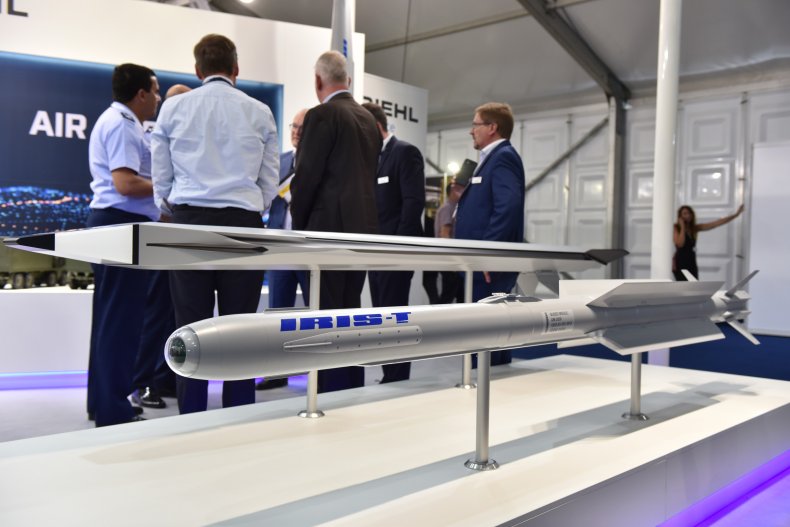Russian President Vladimir Putin‘s string of missile strikes in at least 10 Ukrainian cities has prompted Western allies to rush to deliver additional aid in the form of modern defense systems.
On Monday, Germany announced it would provide the first of four new IRIS-T air defense systems to Ukraine within days. The land-based air defense systems, which use modified short-range missiles, has an operating range of up to 40 kilometers and target detection range of 250 kilometers.
“The renewed missile fire on Kyiv and the many other cities show how important it is to supply Ukraine with air defen[s]e systems quickly,” German Defense Minister Christine Lambrecht said in a statement. “Russia’s attacks with missiles and drones terrorize the civilian population in particular. That is why we are now providing support especially with air defen[s]e weapons.”
Lambrecht’s remarks come after Putin ordered dozens of missile strikes on Monday morning, that pounded civilian areas, killing at least 11 people nationwide and knocking out power and heat in multiple cities, including the heart of Kyiv. The Kremlin leader said the attack was in response to the blast that hit Russia’s bridge to Crimea over the weekend.

John Keeble/Getty Images
The escalation of events have ramped up pressure on Ukraine’s Western allies to deliver advanced military technology to aid Ukrainian forces, who recently made significant gains in the east and a sudden advance in the south.
“The best response to Russian missile terror is the supply of anti-aircraft and anti-missile systems to Ukraine – protect the sky over Ukraine!” Ukrainian Defense Minister Oleksii Reznikov tweeted on Monday. “This will protect our cities and our people. This will protect the future of Europe.”
William Reno, the chair of the political science department at Northwestern University, told Newsweek that Germany’s decision to speed up its delivery of the defense system is to help “fill a gap” as Kyiv waits for the delivery of a U.S. defense system that is expected to come in late November. In late September, the Pentagon said it would send to advanced antiaircraft systems to Ukraine within the next two months.
“Germany’s government took the opportunity to show [the U.S. and other NATO members] that it is committed to supporting the collective effort to back Ukraine’s government in this conflict,” Reno said.
Estonian Prime Minister Kaja Kallas also said in a Monday video that the best way to support Ukraine is to “deliver air defenses from the allied side so that Ukrainians can protect their cities and civilians because Russia is definitely escalating to harming civilians.”
According to Oleksiy Arestovych, an adviser to Ukrainian President Volodymyr Zelensky, most of Russia’s targets were civilian infrastructure sites that provided heat and electricity, furthering Moscow’s warnings of a dark winter ahead.
In response to Monday’s bombardment of strikes, the leaders of the Group of 7 nations will hold a virtual summit on Tuesday, according to a European Union official.
U.S. Secretary of State Antony Blinken said he spoke with his Ukrainian counterpart “following the Kremlin’s horrific strikes” to reiterate the U.S. would “continue to provide unwavering economic, humanitarian, and security assistance so Ukraine can defend itself and take care of its people.”
Newsweek reached out to the federal government of Germany for comment.


Comments